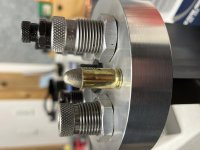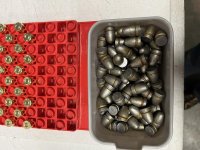Just a note to share some success. I've been casting more, mostly pistol, in retirement. I've upgraded my press to a combination of RCBS Rockchucker and a Harrell's turret press. I use the RC press for case reforming and resizing. The Harrell's is used for priming, flair, seating and crimp. In addition, I have purchased two Harrell's powder meters, one for rifle and one for pistol. This transition has taken a long time and many mistakes. That loading has finally come together in stages - starting with casting. The powder meters make the biggest difference in efficiency. I still weigh a few charges but not every one.
I'm not the best caster, and I don't really worry about alloy composition. I use a lot of range lead and keep my load under 1000 ft./s. And I'm not the best reloader. My components are range scrap, and range pick up brass. But I feel good that I finally reached the point that I can cast and load all of my own now, and turn out a box of shells with reasonable efficiency, and each bullet is substantially the same as the next.
So my question is whether there is a point in your reloading career when you realized that it started to come together, and you no longer felt like it was work, but rather a pleasure? I hate it when hobbies become jobs.
The photo is a 225 gn Lyman 452374. The manual says to seat it a little longer. But this is magazine length. 4.6 gn Clean Shot (D032).
I'm not the best caster, and I don't really worry about alloy composition. I use a lot of range lead and keep my load under 1000 ft./s. And I'm not the best reloader. My components are range scrap, and range pick up brass. But I feel good that I finally reached the point that I can cast and load all of my own now, and turn out a box of shells with reasonable efficiency, and each bullet is substantially the same as the next.
So my question is whether there is a point in your reloading career when you realized that it started to come together, and you no longer felt like it was work, but rather a pleasure? I hate it when hobbies become jobs.
The photo is a 225 gn Lyman 452374. The manual says to seat it a little longer. But this is magazine length. 4.6 gn Clean Shot (D032).
Attachments
Last edited:


